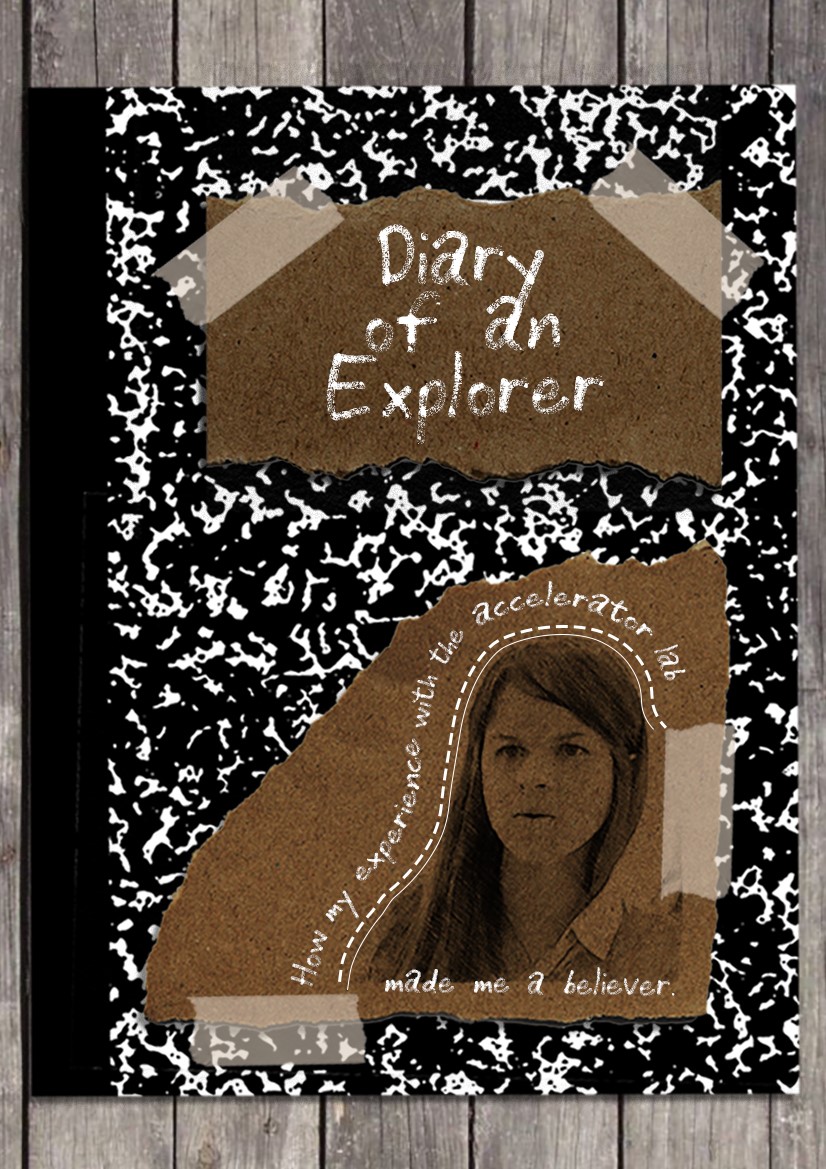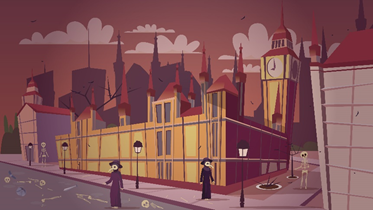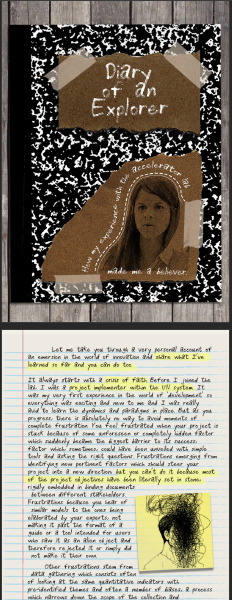By Nadia Ben Ammar, Head of exploration, Accelerator Lab
Diary of an explorer
19 février 2021
Part 1: How my experience with the Accelerator Lab made me a believer
Let me take you through a very personal account of an immersion in the world of innovation and share what I’ve learned so far and you can do too.
It always starts with a crisis of faith
Before I joined the lab, I was a project implementer within the UN system. It was my very first experience in the world of ‘development’ so everything was exciting and new to me and I was really avid to learn the dynamics and paradigms in place. But as you progress, there is absolutely no way to avoid moments of complete frustration. You feel frustrated when your project is stuck because of some unforeseen or completely hidden factor which suddenly became the biggest barrier to its success, factor which, sometimes, could have been unveiled with simple tools and asking the right questions. Frustrations emerging from identifying new pertinent factors which should steer your project into a new direction, but you can’t do it because most of the project objectives have been literally set in stone, rigidly embedded in binding documents between different stakeholders. Frustrations because you hear of similar models to the ones being elaborated by your experts, not making it past the format of a guide or a tool intended for users who saw it as an alien object and therefore rejected it or simply did not make it their own. Other frustrations stem from data gathering which consists often of looking at the same quantitative indicators with pre-identified themes and often a number of biases, a process which narrows down the scope of the collection and interpretation exercises considerably. What is relevant for us to keep in mind at this stage, is that these frustrations and the limited opportunities to address them create in us a phenomenon referred to by psychologists as ‘learned helplessness’, where we carry on doing our best but feel at the same time, we cannot change the entire system by ourselves.
Enter the ToRs
I remember very vividly the first time I laid my eyes on those Head of Exploration ToRs. ToRs are job descriptions. I must have rubbed my eyes a couple of times before turning to my colleague saying “hey come check this out!”. I sure recognized myself in those ToRs and the role, though still a mystery to me, seemed like a lot of fun. I thought, well let’s give it a try. I mean, this was right in the middle of a crisis of faith, a time when people are usually open to trying new pathways in life, break free from the known, that which has triggered the crisis in the first place. I wasn’t sure whether the activities or objectives listed in the ToRs were going to revolutionize the way we do development or provide the answer to my frustrations, but I thought that it will definitely be an interesting experience, one of learning, and maybe more. I mean if I get the opportunity and freedom to literally “explore” aspects which seem pertinent to me, take my time to learn about challenges using all these tools without the pressure of implementation results and deadlines, it can result in something powerful, or not? I wasn’t quite sure what I would find.
The immersion or the shock, no, the immersion!
Like a monkey sent to space, I was sent to a regional Accelerator Labs network meeting. I was new to the team and was still trying to figure out what my week would look like in my new role. There’s a bunch of really intimidating people in the room, my fellow labbers (I was genuinely impressed with every single one of them during talks and activities). I was equally intimidated by the new jargon. ‘Horizon-scanning’, ‘sense-making’, ‘grassroot solutions’…woah woah woah, slow down, what was the first one you mentioned again? I mean the people around me, I started to wonder whether they came from a parallel universe where everybody spoke a similar code/language. I mean if these people were living on earth, during the same era as myself, why was I never confronted with these terms, read about them, wait, have I been reading the wrong stuff all this time? I felt dizzy, lost, overwhelmed but strangely excited. This was definitely not my comfort zone, but I was hooked.
The resistance phase (aka “I get it, I get it…wait what no I don’t get it at all”)
Started my work with the lab after this first experience. Team members were roughly my age and had very cool profiles, ones I’ve never worked with before. They were around for longer, so they walked me through what a ‘learning cycle’ is, what my role is and how it complements each of the other lab members. This is when I went through a rollercoaster of ‘totally grasping what we’re doing: seeing the known in the unknown linking my previous knowledge to lab practices and then not getting it at all: misunderstanding by trying too hard to link new unknown or new practices to the familiar and hurting myself with my heuristic biases. There was a lot of “no, this is not the approach, instead, we do this” or “unlike classical implementers, we do that…”. I was confronted with the fact that while it was good to link familiar elements with my new role and use old concepts and processes as mental schemas to understand things around me, some needed to be abandoned in order for me to be able to fully grasp what was lying ahead. No matter how strong our crisis of faith may be, and no matter how badly we want to break free and embrace the “new ways”, we are still bound to our previous “confession”.
At some point I started wondering where we were going with all these methods, have I hoped for too much? The methods and approaches made sense and they unveiled new aspects but what was the impact of our work in the long-term, what were the palpable results we were achieving. Where is the structure in our work and how can we systemize it, scale-up experimentation? (questions we still ask ourselves). Another faith of crisis followed, a darker one since I felt that I had been putting too much excitement in what seemed as a fun journey with a lot of learning, one ending inevitably in more questions.
COVID-19: a first savior
Picture Legend: Beyond being one of the deadliest pandemics in history, the black plague has revealed vulnerabilities in the Governance and power systems in Europe and precipitated big changes. What Learnings and Changes can COVID-19 bring to humanity? (Designed by vectorpouch / Freepik)
During the first COVID-19 wave, everything was put on hold during lockdown. We turned our attention to the crisis, the never-experienced-before shock, the unknown. No guidelines were there and we had to swim though everything new coming our way. We started to explore issues like misinformation and risk behaviors linked to the pandemic, social solidarity initiatives which boomed and some more. The crisis changed into an opportunity for learning and generated interesting insights. The flexibility of our paradigms of work as a lab helped us a lot to quickly repurpose our actions, while many were struggling with how to make themselves useful during a time of crisis. We were thriving on the learnings emerging: the vulnerabilities it was revealing in the system, the incredible boost it was provoking in terms of social innovations, citizen-led initiatives and even novel behaviors it was generating. The crisis also came with opportunities for real systemic changes and a real appetite from government to adopt new ways which were more shock resilient. I started to really feel the force, and yes I’m well aware of what that sounds like. Covid presented us, also, with a real opportunity to introduce new tools and methods to anyone hit with the reality, that we needed a real transformation and new innovative tools in order to better anticipate shocks and generate fast learnings to inform programs and interventions for fast-changing needs.
Azza, aka the tool master
Picture Legend: The dawn of civilization and the discovery of tools (scene from 2001 Space Odyssey by Stanley Kubrick)
Yes, I’m bringing in a character into my story, our experimenter, because of the role she played in my learning journey. Tools. Let us start with those. Is it okay to say that tools were my real gate into embracing what we do as a lab, understanding its potential and be fully aware of its transformative power? Tools, when seen without their context, might not do much to our imagination or in the way we do things or think about things. But using tools in specific contexts of development challenges to generate insights and learnings and to then use them to transform these learnings into actionable and testable artifacts or models, that my friends, is powerful. As Morpheus put it so well “There is a difference between knowing the path and walking the path” and oh how right he was. And this is where the role of our experimenter was key. She has accompanied me through the path. While using tools she either adapted or designed from scratch in the context of collective intelligence workshops, I was confronted with aspects of challenges which I did not see before. The data was rich, the knowledge generated was powerful and put in the right hands could make a tremendous difference in the way projects were implemented, stakeholders were approached, people were mobilized. Every tool used allowed us to further empathize with our partners, system users and people involved, and results obtained constantly challenged our assumptions and widened the range of possibilities of experimentation or entry points for possible interventions. At the top of all these tools, something to unite all these methodologies into a model and make them more powerful as a whole, the portfolio approach. If you want to find out more about how a portfolio approach can we used in the context of specific development challenges, have a look at how the Pakistan AccLab team , or the Fiji AccLab team, among many, used a portfolio approach to unpack complex development problems.
The Network
It took me time to get used to the work dynamics of the lab. I mean can you imagine a global network composed of 60 (now about 90) labs, each composed of 3 heads and a global team to design and support the learning experience scattered around the globe, I mean you can imagine the challenges in orienting yourself in such a complex environment. And just to add to the complexity of this, we meet on weekly basis (yes that’s right) in one global call where we share learnings and capitalize on initiatives of our individual labs and we also have by-weekly calls by role (explorers, experimenters and solution mappers). Somehow (please do not ask me how) it works! How do I know? I have personally built capacities, discovered new methodologies and tools and shared learnings with this network of people. I have learned from the experience of “Acclabbers” all around the world from Malaysia to Colombia passing by Lebanon and Iraq. This is not a mere sharing of experience. This is often a firsthand glimpse into a contextualized process and learning experience, one which you can duplicate in your own context, get inspired from to design further learning areas and questions or ways to verify and compare your own results and experiences. This process can help unveil global patterns of change and put together signals of bigger and more systemic changes happening in the world. Jealous much?
Sharing the wisdom
I was really excited to share what I was learning with people around me, my network of friends and professionals, who like me, I knew it, would benefit a lot from all this world of innovation, a world they do not grasp the power of. Much like newly converted people into a new confession, I wanted to share my passion with the rest of the world, but not as a mere roar of excitement, I wanted to genuinely bring these methods and tools to people who, like me, are or were outsiders to these approaches and were somewhat intimidated, skeptical or simply unfamiliar with a coded universe. I was fully aware of the barriers stopping people from immersing themselves into these methodologies, tools and practices, I knew many were put off by the jargon, the apparent lack of structure or the seeming lack of palpable quantitative concrete results of many of these activities. I knew some people thought that innovation was just a funky phenomenon which is now fashionable and could make development a bit more attractive but that at the end nothing useful would come out of it. Being aware of all these could make me a perfect missionary, someone who could empathize with people who are ‘outsiders’ and thus would know how to introduce innovative methods and help people adopt them to enrich their capacities to adapt to a complex reality they operate in. I felt it was a responsibility.
Using old mental schemas to explain and ground newly acquired approaches
Using newly acquired tools provided during signal mapping sessions, I started introducing program and project colleagues at UNDP to futures insights methodologies. Because this was done in the context of programming, many (not all) colleagues were as mind blown as I was when I first discovered the power of using these tools to not only anticipate ‘new normals’ but also identify programmatic opportunities linked to these futures. I started a process of introducing simplification tools to redesign operation processes and make them more efficient without compromising their integrity. I will not stop at this and I have made it my personal mission to find opportunities where I introduce in as much a practical way as possible the tools and approaches I’ve been discovering in the past few months while working as a head of exploration in the accelerator lab. I still consider myself a rookie in a way but I am also convinced now that as long as you have a curious and creative mind and as long as you’re passioned about understanding things and unveiling new aspects of how things work, you’ll do just fine. I’m not sure whether anybody could be hero, but I can tell you that with ingredients above, anybody could do innovation. And if like me, you have a curious mind but don’t know where to start with this, here is a few of the toolboxes I have used and which will be gentle on you by a)contextualizing the use of the tools/approaches enlisted or b)walking you through examples of what you can get out of using these tools and mainly c)are designed simply and pedagogically and result in powerful insights and learnings. The Collective Intelligence Design Playbook developed by Nesta, The OPSI (very comprehensive) Toolkit navigator by, OECD and The Futures toolkit developed by The UK office of Science.
Challenges ahead
Communicating and making the case for innovative methods takes more elaboration and content often is less intuitive and thus difficult to convey to others. When sharing some of my experiences to my former colleagues and friends, I have often been confronted to the “you’re talking like one of them now” the skeptical looks or the amused and sarcastic “oh so what are you really doing?” or better yet “what is the real value and impact of your work on development in the country?”. I understand, I’ve been there. What I really find frustrating is that I have a very elaborate answer to the latter question, that answer however requires a bit more elaboration and might seem less intuitive and powerful then a something like “I train social workers” or “I’m reforming the agriculture sector” or “I’m building schools for children”. Sometimes when an answer is too elaborated, it gets less attention and adherence, so I suppose one of the biggest challenges ahead is explaining in an intuitive way, the wonders of innovative tools and methods. Learning by doing and creating successful experiments of using these tools and approaches is going to be one of the best ways. And if you want a glimpse of the answer to the above question, take a look at our ‘Strategy to Scale Social Innovation’ elaborated by UNDP in collaboration with Columbia University (SIPA). Stay tuned for next diary entry.

 Locations
Locations



